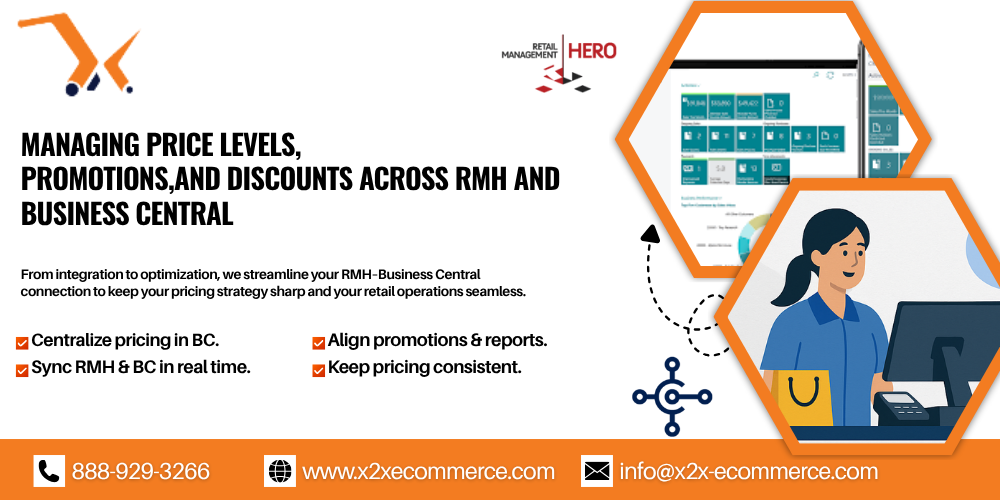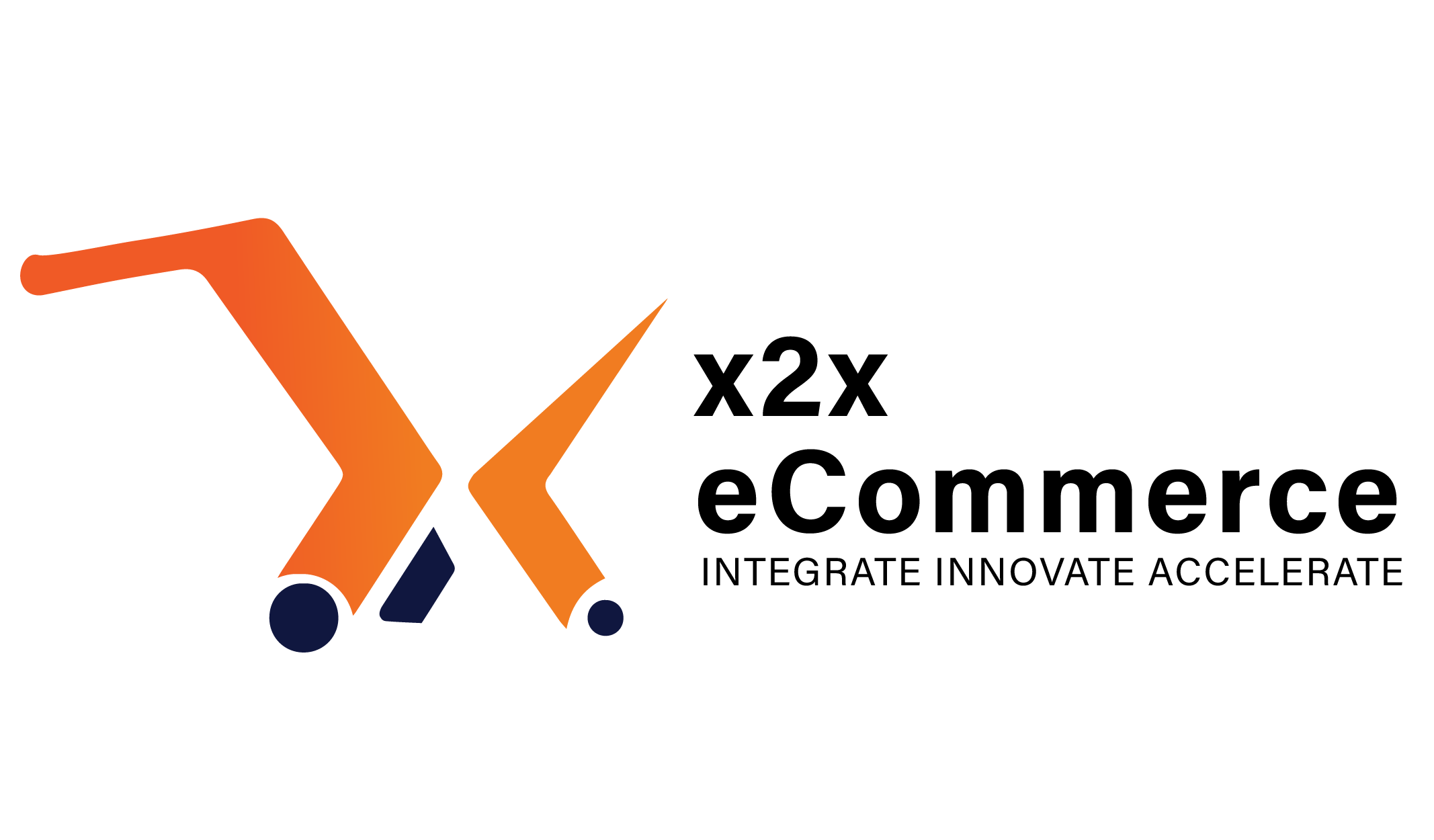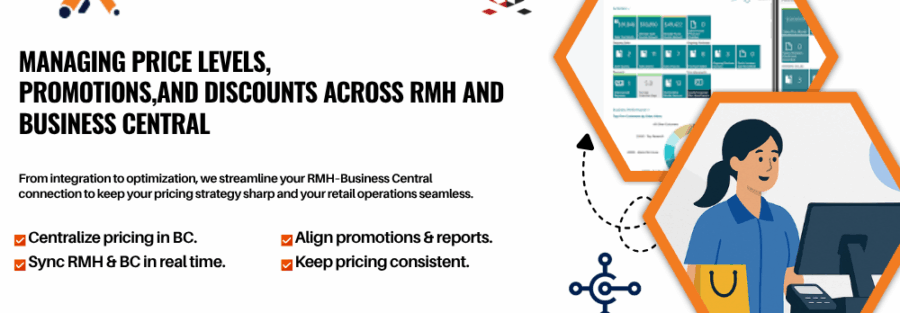
In today’s competitive retail market, stable and flexible pricing across all channels is crucial to ensuring customer satisfaction and profitability. Level management of prices, promotions, and discounts for multi-store retailers who operate Retail Management Hero (RMH) with Microsoft Dynamics 365 Business Central (BC) can be optimized if there is a cohesive strategy and synchronization.
Here, we will describe how price management can be efficiently coordinated and controlled between RMH and BC to ensure accuracy, agility, and expansion.
Why Price Management is Important in a Dual System Implementation
Having two systems, point of sale (RMH) and back-office ERP (Business Central), you experience issues such as:
Price or promotion disparities
Timing lags between updates on systems
Reduced visibility into discount success
Varied customer experiences across stores and channels of sales channels
That’s why it’s not only advisable to have an efficiently integrated solution for handling price levels and promotions, but our experts think it’s a necessity.
1. Getting to Know Price Levels in RMH and Business Central
In RMH:
Price levels allow you to have several different pricing configurations for different customer groups, locations, or promotional offers. You can establish:
Standard price
Wholesale or preferred customer price
Regional variations in price
Time-related promotional pricing
In Business Central:
Discounting and price management are achieved via Sales Price and Sales Line Discount tables, where you can create prices based on:
Customer
Customer price group
Item or item group
Date range
Minimum quantity
Tip: BC supports dynamic pricing logic with price groups and hierarchies, perfect for centrally managing promotions that synchronize to RMH.
2. Central Price Management within BC for Retail Control
Business Central should be your master price engine, where
All base price and discount configurations are synced
All promotions are pre-scheduled with prompt start and expiration times
Price groups are associated with RMH customer types or loyalty bands
By using Business Central as the system of record, retailers can be sure of consistency and control, and enable RMH to pull prices in real-time or at planned syncs.
3. Promotions and Discounts: Best Practices
Types of Promotions Typically Managed:
Item discounts (amount or percentage)
Buy One Get One (BOGO)
Mix and Match offers
Tiered prices by quantity
Loyalty-based promotions
Managing Promotions in RMH:
RMH promotes a strong promotions engine where the promotions can be configured at the POS level. These, however, should be correctly mapped with Business Central’s sales price structures to allow correct reporting as well as margin calculation.
Managing Promotions in Business Central:
While BC currently lacks support for enhanced POS-style promotions as is, you can handle:
Customer-specific pricing
Campaign-based pricing
Tiered pricing and quantity breaks
Integration Tip: Implement a connector or customization to allow the promotions developed in BC to be properly interpreted and displayed in RMH. Frequent sync jobs and validation checks can prevent price issues.
4. Real-Time Synchronization and Data Flows
A successful integration of RMH and BC should feature:
| Function | Origin System | Sync Direction |
| Item Master Data | BC | BC → RMH |
| Price Levels | BC | BC → RMH |
| Promotions | BC or RMH (based on complexity | Bi-directional or BC → RMH |
| Sales Transactions | RMH | RMH → BC |
Centralizing price changes ensures that updates are automatically sent out to all stores without the need for human intervention or pricing errors.
5. Cross-System Reporting and Analysis
BC supports strong financial and inventory reporting, while RMH provides real-time sales insight. Synchronizing promotions and price levels in both systems gives you:
Correct margin analysis
Improved campaign performance monitoring
Streamlined inventory valuation considering discount effects
Wise price, promotion, and discounting decisions from actual data
Final Thoughts
Price, promotion, and discount management within RMH and Business Central does not have to be cumbersome if you keep prices centralized in BC and have adequate synchronization processes. By doing so, you reap:
The same price everywhere
Simple promotion planning
Solid financial and sales reporting
Better customer experience
Whether you are running a few stores or expanding out a retail chain, coordinating RMH and Business Central for pricing functions will enable new levels of efficiency and analysis for your business.
In need of assistance setting up or optimizing your RMH-BC integration? Contact our retail and ERP experts today.





